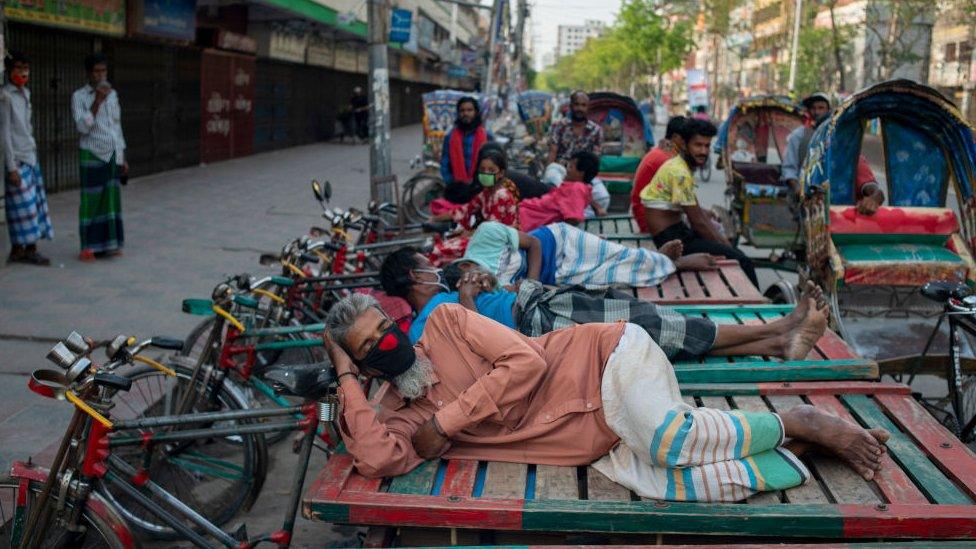Covid: Cancel developing countries' debt, MPs urge
- Published

The UK government should cancel the debt owed by developing countries struggling with the impact of Covid-19, MPs have said.
The International Development Committee warned that the pandemic was fuelling extreme poverty and food insecurity.
It was also disrupting routine healthcare, such as tuberculosis immunisations, it added.
The Foreign Office said it was spending £1.3bn to protect livelihoods, improve health systems and distribute vaccines.
More than two million people around the world have died after contracting coronavirus, with almost 100 million cases reported.
Appearing before the Commons International Development Committee, Foreign Secretary Dominic Raab said he wanted the UK to be a "force for good in the world" as it fought the pandemic.
He defended the government's decision to cut overseas aid spending next year, saying there were "no easy choices" given the hit to the public finances from the pandemic.
The cuts mean the UK will fail to meet the UN target of spending 0.7% of national income on overseas aid in 2021-2, a target that was enshrined into UK law in 2015.
Mr Raab said he hoped the UK would be able to reach 0.7% again as "soon as possible" but this would only happen once the long-term damage to the UK's balance sheet had been "corrected".
Labour said the government was "betraying the world's poorest."
Shadow international development secretary Preet Kaur Gill said: "This move signals a retreat from the world stage, damages the UK's reputation and will only show our allies and detractors that Britain under Boris Johnson is no longer interested in fulfilling our moral or legal responsibilities.
"Labour are committed to spending 0.7% of Gross National Income on aid to tackle global poverty and injustice and will oppose any attempt from this government to damage this country's reputation."
'Unlawful'
Mr Raab said he took seriously warnings from Conservative MPs and ex-ministers that to press ahead with the cuts without passing new legislation would be unlawful.
Former Solicitor General Lord Garnier said earlier on Tuesday that Mr Raab's "reputation" and the government's domestic and international standing would be damaged if it was seen to "flout a clear legal obligation".
In tough financial times, Mr Raab said the UK needed to "make the most" of its £10bn spending, external, avoiding "salami-slicing" budgets and focusing on a handful of priorities such as climate, biodiversity, conflict prevention and helping the "bottom billions" out of extreme poverty.
"I think we should unabashedly be proud and confident about the moral responsibility we have to make the world a better place," he said.
"At the same time, I see a range of grittier strategic interests in dealing with climate change and humanitarian suffering and indeed trade."
Global recession
The Foreign Office took over responsibility for overseas aid in September after absorbing the Department for International Development.
On debt cancellation, the committee said that, due to disruption caused by the pandemic, millions of people in developing countries were more at risk from diseases such as tuberculosis because of missed immunisations.
Millions were more likely to lose their livelihoods because of the global recession and millions of women were more exposed to sexual violence.
The MPs want the government to provide more aid to address the problems and cancel long-term national debt that was diverting cash away from those in need.
A Foreign Office spokesperson said: "We'll only be safe from coronavirus when we're all safe - which is why the UK is leading global efforts to fight this pandemic, committing up to £1.3bn of new UK aid to find and equitably distribute a vaccine, strengthen health systems, protect livelihoods and support the global economy."
They added that the UK would use its 2021 presidency of the G7 group of leading economies "to help the world build back stronger and fairer after the pandemic".
This would include "promoting open societies, championing gender equality and girls' education, and setting out new international approaches to global health security and climate action", the spokesperson said.
The UK has announced it will step up its efforts to help other countries, including some of the poorest in the world, to find new variants of Covid-19.
In a speech in London, Health Secretary Matt Hancock said the UK would share its world-leading genomics expertise worldwide to help countries identify new mutations of the virus and protect global health security.